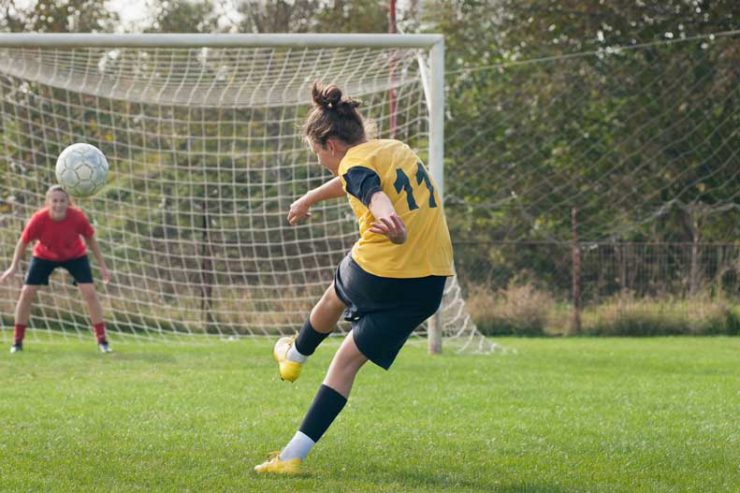According to research by the UPMC Sports Medicine Concussion Program, one in ten high school athletes in the United States who play contact sports will suffer a concussion each year they play.
One of those athletes is Melissa, a high school soccer player from Cleveland, Ohio. She has sustained four sports-related concussions in her career, one of which caused her to have year-long headaches.
When she later experienced sharp neck pain, dizziness, and headaches following a hit during a fall soccer game, Melissa’s family was eager to have her evaluated.
“Concussion is a serious medical issue that requires prompt clinical attention by a health professional trained in concussions,” said Micky Collins, PhD, clinical and executive director of the UPMC Sports Medicine Concussion Program in Pittsburgh, Pennsylvania.
Never Miss a Beat!
Subscribe to Our HealthBeat Newsletter!
Thank you for subscribing!
You can now select the specific newsletters you'd like to receive.
You are already subscribed.
Subscribe to more newsletters in our email preference center.
Sorry, an error occurred. Please try again later.
Get Healthy Tips Sent to Your Phone!
“After sustaining a possible concussion, athletes should immediately be removed from play.
“Once an injury has occurred, the brain is in an extremely vulnerable state and more susceptible to additional injury.”
Melissa was first assessed by her team’s athletic trainer, who encouraged her to follow up with her doctor if her concussion symptoms persisted. She began seeing a local neurologist, and started taking medication for headaches, but saw little improvement.
Her academics also suffered. In school, Melissa reported having:
- Loss of focus and concentration
- Trouble completing homework, as it felt harder and took longer to complete
- Difficulty with test taking
“Getting a concussion can affect more than just a person’s status onto the team roster or ability to play a sport or work out,” Dr. Collins said. “One of the hardest parts about having a concussion is dealing with the toll it takes on a student’s academic life.”
Frustrated with a lack of progress and the emergence of these new symptoms, Melissa’s mother started looking online for options. She found ReThinkConcussions.com and called the UPMC Sports Medicine Concussion Program to schedule an appointment.
Founded in 2000, the UPMC Sports Medicine Concussion Program sees more than 17,000 patients annually, produces more published research than any program that followed and continues to set the standards of care. The program is internationally renowned for pioneering ImPACT®, a tool that establishes a benchmark for a patient’s normally functioning brain activities.
To learn more about the UPMC Sports Medicine Concussion Program, visit ReThinkConcussions.com or call 412-432-3681.
“We perform a thorough assessment of concussion, which includes neurocognitive evaluation with ImPACT®, a detailed clinical interview that discusses symptoms, and an evaluation, or screening, of vestibular and ocular-motor functioning,” Dr. Collins said.
Melissa and her family traveled to Pittsburgh, where she met with Dr. Collins and his team for a comprehensive clinical evaluation, including taking the ImPACT® test. From there, the clinical team developed an individualized treatment plan for her, which included vestibular and exertion therapy, as well as accommodations in school.
“Because no two concussions are alike, there’s no simple timetable for recovery,” Dr. Collins said. “Some athletes recover in days, others require weeks or months.
“We’ve identified six unique clinical trajectories for concussion. Every trajectory requires specific treatment.”
Dr. Collins leads a program consisting of more than 30 faculty and staff members, all of whom are devoted entirely to assessing, treating, rehabilitating, and researching concussion. They include:
- Neuropsychologists
- Primary care sports medicine physicians
- Neurosurgeons
- Physical medicine and rehabilitation physicians
- Neurovestibular and exertional physical therapists
- Cognitive rehabilitation specialists
- Certified athletic trainers
The concussion program team continually re-examines patients to evaluate their progress and promote successful rehabilitation.
For Melissa, once she began her vestibular and exertion therapy exercises twice a day, she finally felt like she had the tools she needed to get better. A month after her initial appointment with Dr. Collins and his team, she was finally headache-free and cleared to return to soccer.
“I came [to UPMC] thinking I would be told I could never play soccer again, but after completing my exercise program, I was preparing for spring soccer,” Melissa said.
About Sports Medicine
An athletic lifestyle carries the potential for injury. Whether you’re an elite athlete or a weekend warrior, UPMC Sports Medicine can help. If you are looking to prevent, treat, or rehabilitate a sports injury, our multidisciplinary team of experts can help you get back into the game. If you are seeking to improve your athletic performance, we can work with you to meet your goals. We serve athletes and active people of all ages and experience levels. Our goal is to help you keep doing what you love. Visit our website to find a specialist near you.
